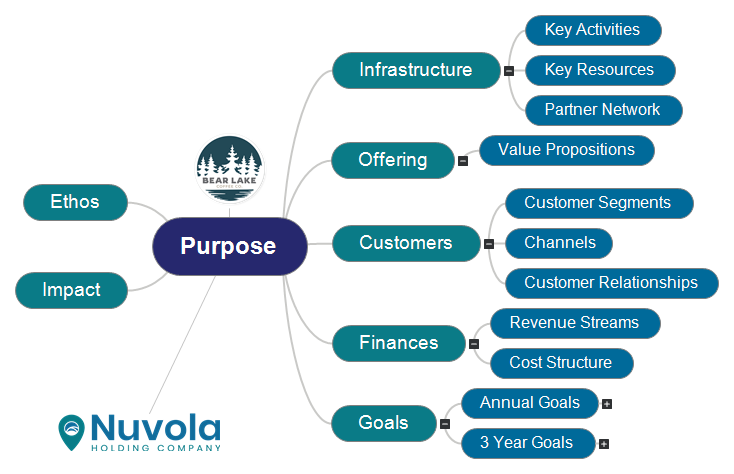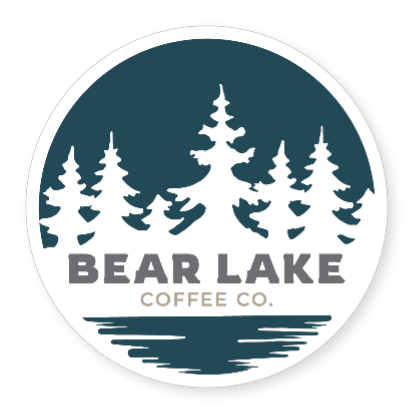How to Build a Purpose-Centered Business Model
The sustainable business model showcases how an organization creates, delivers, and captures value in a sustainable way. In this post, I want to dig into the modified Business Model Canvas that we used when developing a sustainable business model for Bear Lake Coffee Co., the first portfolio company of Nuvola Holding Company, set to launch in April!
What is the Nuvola Business Model Canvas (nBMC)?
Our modified business model canvas – which we are calling the Nuvola Business Model Canvas – is a strategic management tool built on the concepts of the original Business Model Canvas developed by Alexander Osterwalder. Our version places a business’s purpose at the center and adds in additional elements for ethos, impact, and goals.

The nBMC is intended to be a strategic planning tool and should be established at the inception of your business. While many elements are a fundamental part of your core business, you should be reviewing and updating this canvas annually at a minimum. Now let’s dig into the details:
- Purpose: It starts with a purpose statement. This summarizes the reason your company exists — beyond simply making a profit.
- Ethos: The ethos of a company is its North Star. Here you should outline it’s your core values and operating principles.
- Impact: How will the business impact the planet or local community? Outline how you plan to use business as a force for good to impact your workers, community, and the environment. It’s more than measuring intentions, inputs, and activities; it goes the extra distance to detail the outputs and outcomes for how the business will make an impact.
- Infrastructure:
- Key Activities: These are necessary to drive overall revenue and deliver on the value proposition to your customers and community.
- Key Resources: Identify the primary assets you need to create value. This could include employees, finances, equipment, technology or intellectual property.
- Partner Network: Outline the key partnerships that help optimize operations, reduce risk and allow the company to focus on its core business.
- Offering:
- Value Propositions: The collection of goods and services your business offers to meet the needs of its customers. At the heart of the value proposition is what distinguishes your company from its competitors and what the brand promise is for customers.
- Customers:
- Customer Segments: Who are your target customers and how do you segment them (by demographics, psychographics, etc.)? This also details the customer journey and how you meet customer needs at each step. It is important to define and rank your customer segments according to importance and core focus.
- Channels: Channels are where your business distributes value. This can be a combination of online, brick-and-mortar, or partner distribution channels.
- Customer Relationships: Here you will address how you Retain, Develop and Acquire (aka RDA model) customers. This is where marketing and sales are joined together to execute focused customer relationships that are aligned with your purpose and have the wallet share to support your business goals.
- Finances:
- Cost Structure: This details any costs the business will incur during operation, including variable and fixed costs. This considers one-time startup costs and regular operational costs.
- Revenue Streams: How does your business make money? This could be through single transactions and/or through subscription models
- Goals:
- Annual Goals: These are specific goals for the year ahead in an OKR format with supporting systems to measure KPIs on a daily basis.
- Long-term Goals: These are your aspirational goals over a long-term horizon. When a company is in start-up mode, it makes sense to be more pragmatic and focus on goal horizons that are three years or less.
The Purpose Foundation
After spending a few months iterating through our initial business model, it is clear that purpose, ethos, and impact are the foundation on which the company will rest. The infrastructure, offering, customers, finances, and goal elements will be shaped by having the right people asking the right questions that will make our first portfolio company amazing.

Purpose: We are on a mission to connect you with exceptional small-batch specialty coffee that is best for the planet and for you.
Ethos: A stranger is a friend we have yet to meet. We seek to make connections and build bridges always. We put community first; it is at the heart of our operations. We strive to nurture healthier customers, stronger communities, and a sustainable environment in everything we do.
Impact: Each purchase gives 2% net revenue to the communities behind our coffee. Your purchases directly support initiatives that make a positive impact on the environment and the people behind the coffee we share. We will be publishing an annual Impact Report to share how you are making a difference.
I am proud to announce that Bear Lake Coffee Co. has obtained its B Corp Pending Certification. Taking this step signals to current and future investors that a company measures and manages its social and environmental performance with the best tools available. Certified B Corporations are leaders in the global movement for an inclusive, equitable, and regenerative economy.
Read more:
- Sustainable Business Models in Building Long-Term Value (Sustainable Business Model.org)
- Business Model Canvas (Wikipedia)
- Closing the Gap Between Sales & Marketing (Marketing Strategy)
- B Corporation (Wikipedia)
- B Corporation Certification (B Corporation)
- Information about Pending B Corps (B Corporation)
Recommended Reading

Welcome to our very first blog post! Nuvola Holding Company was founded with a core focus of building purpose-driven businesses that do good for our planet and its people, and we are excited to begin this journey with you. Today, we want to dig into the basics of why businesses that operate with an authentic purpose outperform their competition.


